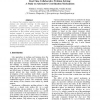Free Online Productivity Tools
i2Speak
i2Symbol
i2OCR
iTex2Img
iWeb2Print
iWeb2Shot
i2Type
iPdf2Split
iPdf2Merge
i2Bopomofo
i2Arabic
i2Style
i2Image
i2PDF
iLatex2Rtf
Sci2ools
101
click to vote
ICALT
2003
IEEE
2003
IEEE
Real-Time Collaborative Problem Solving: A Study on Alternative Coordination Mechanisms
It is believed that computer-supported collaboration at a distance can stimulate learning. In this paper an innovative environment that permits real-time collaborative problem solving is described. In particular we study the effect of two alternative coordination mechanisms on the problem solving activity of pairs of students engaged in concept map building. The first mechanism imposes locking of the shared activity board for one student at a time, while the second mechanism allows access of all group members to the shared activity board in a contemporary way. The reported findings are of interest to researchers and practitioners who are involved in the design and study of real-time collaborative learning environments.
| Added | 04 Jul 2010 |
| Updated | 04 Jul 2010 |
| Type | Conference |
| Year | 2003 |
| Where | ICALT |
| Authors | Nikolaos M. Avouris, Meletis Margaritis, Vassilis Komis |
Comments (0)

